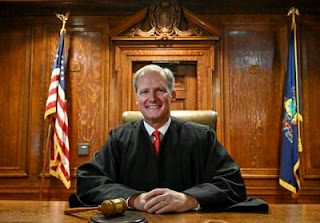The below article of mine recently appeared in the December 14, 2017 edition of the Pennsylvania Law Weekly and is republished here with permission:
Precedent Has a Way of Repeating
Itself: A Year-End Review of Cases, Trends
By Daniel E. Cummins
Pennsylvania Law Weekly
December 14, 2017
Another year of litigation has
come to a close. Given that precedent has a way of repeating itself here’s a
look back at notable decisions from the past year.
Elements of Bad Faith Claim
In its decision in the bad
faith case of Rancosky v. Washington National Insurance, No. 28 WAP
2016 (Pa. Sept. 28, 2017), the Pennsylvania Supreme Court, for the first time,
considered the elements of a bad faith claim under 42 Pa.C.S.A. Section 8371.
In Rancosky, the Supreme
Court adopted the two-part test enunciated in the case of Terletsky v. v.
Prudential Property & Casualty Insurance, 649 A.2d 680 (Pa. Super.
1994), which provides that a plaintiff must present clear and convincing
evidence of: that the carrier did not have a reasonable basis for denying
benefits under the policy, and that the carrier knew of or recklessly
disregarded its lack of a reasonable basis.
The Pennsylvania Supreme Court
went on to note that evidence of a motive of self-interest or ill will was not
a prerequisite for a plaintiff to prevail on a statutory bad faith
claim.
Dead Man’s Rule
The Pennsylvania Superior Court
provided its latest take on the Dead Man’s Statute, 42, Pa. C.S.A. 5930, in the
case of Davis v. Wright, 2017 Pa. Super. 48 (Pa. Super. Feb. 27, 2017
Shogan, Ott, J.J., Stevens, P.J.E.)(Op. by Stevens, P.J.E.).
In this matter, arising out of a
fatal motor vehicle accident, the Pennsylvania Superior Court found that Dead
Man’s Statute was not waived by the defendant’s participation in discovery when
no depositions or Interrogatories were completed.
The court additionally noted that
this defense under the Dead Man’s Statute did not need to be raised as an
affirmative defense in a new matter pursuant to Pa. R.C.P. 1030 in order to be
preserved.
Moreover, the
court otherwise noted that the issues of negligence in this
automobile accident case could not be established by the testimony of a police
officer who did the accident report but who had no independent recollection of
the incident.
Evidence of Intoxication
In the case of Coughlin v.
Massaquoi, No. 32 EAP 2016 (Pa. Sept. 28, 2017), the Pennsylvania Supreme
Court declined to adopt a bright-line rule of predicating the admissibility of
a person’s blood alcohol content (BAC) on the existence of independent
corroborating evidence of intoxication.
The Coughlin case arose
out of a motor vehicle versus pedestrian accident.
The Pennsylvania Supreme Court
held that the admissibility of BAC evidence remains within the trial court’s
discretion based upon the general rules of admissibility found in the
Pennsylvania Rules of Evidence 401-403, and the trial court’s related
assessment of whether the evidence establishes the party’s unfitness to act in
light of the alleged intoxication.
Use of Powerpoint at Trial
The use of visually stimulating
powerpoint exhibits at trial has become the norm in the digital age.
In the case of W.C. v. Janssen
Pharmaceuticals, 2017 Pa. Super. 356 (Pa. Super. Nov. 13, 2017, Panella,
Ransom, Fitzgerald, J.J.) (Op. by Panella, J.), the court ruled that allowing
counsel to use powerpoint slides as a visual aid during closing argument was
not an abuse of discretion by the trial court. This was particularly so given
that the court found that the slides did not misrepresent the evidence presented
at trial.
The Superior Court also held that
the powerpoint slides were permissible in the closing argument even though the
slides had not been admitted into evidence.
Notably, the court also held that
opposing counsel had no right to review the materials used in an opponent’s
closing argument prior to the presentation of the same.
Cellphone Use
Another recurring issue in civil
litigation matters is the extent to which cellphone use by a defendant during
the course of an accident can support a claim for punitive damages.
In a detailed order issued by
Judge Kimberly J. McFadden of the Northampton County Court of Common Pleas in
the case of Figueroa v. Ferraira, No. C-48-CV-2017-833 (C.P. Northampton
Co. June 8, 2017, McFadden, J.), the court allowed a claim punitive
damages to proceed beyond the preliminary objections stage in a case where the
Plaintiff alleged that the defendant rear-ended the plaintiff’s vehicle at a
red light at an excessive rate of speed and while texting.
The court noted that the defense
retained the right to revisit the issue at the summary judgment stage should it
be determined that the plaintiff had not produced evidence in support of this
claim.
Attorney-Client Privilege
The attorney-client privilege and
the attorney work product doctrine were both reviewd in the case of BouSamra
v. Excela Health, 2017 Pa. Super. 66 (Pa. Super. March 13, 2017,
Bowes, Stabile, Musmanno, J.J.) (Op. by Bowes, J.). The Pennsylvania Superior
Court affirmed the granting of a motion to compel the production of a
memorandum prepared by counsel for the defendant that was shared with an
outside public relations firm.
The court found that the
attorney-client privilege for that memorandum was waived when the client shared
the Memorandum with the outside public relations firm. It was noted that the
public relations firm was not a part of the team offering legal advice.
The court also found that the
work product protection was waived for the same reason.
In its opinion, the Pennsylvania
Superior Court stated that the waiver doctrine analysis is essentially the same
for both the attorney-client privilege and the work product privilege.
Limited Tort
In the case of Vetter v.
Miller, 2017 Pa. Super. 64 (Pa. Super. March 10, 2017) (Ransom, J., Ford
Elliot, P.J.E., Stephens, P.J.E.) (Op. by Ransom, J.), the court affirmed the
trial court’s decision that a plaintiff’s insomnia did not amount to
a serious impairment of a body function for a limited tort the plaintiff under
the facts presented.
This decision was also notable
for the Pennsylvania Superior Court’s analysis of what types of motor vehicle
accident related criminal charges may be admissible in a subsequent civil
case. The court noted that all motor vehicle code violations are
not of equal gravity.
For example, the court noted
that, while evidence of a conviction of driving while intoxicated may be
admissible if supported by ample evidence of intoxication, a guilty plea of
driving with a suspended license was only a summary offense that should not
have been admitted in the court below.
Post-Koken Issues
A number of recurring issues in
post-Koken automobile accident matters continued to be litigated across
the commonwealth of Pennsylvania.
There continues to be an almost
equal split of authority amongst the trial courts across Pennsylvania on
whether a post-Koken litigation should be severed or bifurcated into two
separate matters, one being the third party negligence action and the second
being the breach of contract UIM litigation.
The trend in the non-bad faith cases
appears to be to allow the cases to remain together during the course of
discovery but there remains a split of authority on whether the cases should be
bifurcated for purposes of trial.
To date, other than the
Pennsylvania Superior Court case of Stepanovich v. McGraw and State Farm,
which touched upon the issue but did not definitively decide the issue, there
has been no appellate guidance on the issue of severance or bifurcation. The Stepanovich
decision suggests, but did not decide, that post-Koken claims could be
tried together.
In post-Koken cases
involving bad faith claims, there is still no appellate guidance on severance
or bifurcation and stay orders relative to the bad faith claims. There is a
split of authority among the trial courts, but the federal courts seem to be
trending toward denying motions to sever and stay bad faith claims.
A Look Ahead into 2018
As this year comes to an end,
there are also important rule changes and potential important decisions to
anticipate in 2018.
One decision to keep an eye out
for would be the one in the Pennsylvania Supreme Court case of Gallagher v.
Geico Indemnity, No. 87 WAL 2017 (Pa. Aug. 8, 2017). The court is
expected to address issues pertaining to the validity of household exclusions
and stacking issues with respect to automobile insurance policies.
In the case of Nicolaou v.
Martin, No. 58 MAL 2017 (Pa. Aug. 18, 2017), the Pennsylvania Supreme
Court issued an order agreeing to hear the appeal of a woman whose case against
medical providers over an alleged misdiagnosis of her Lyme disease was
dismissed partly because of Facebook posts indicated that she knew that she was
suffering from the disease for years before filing the suit.
The court has agreed to address
the more specific issue of whether the plaintiff’s claims met an exception to
the discovery rule related to the statute of limitations where the plaintiff
“did not and was financially unable to, confirm [the defendant’s] negligent
misdiagnosis until final medical testing confirmed she had Lyme disease.”
A split Pennsylvania Superior
Court panel previously ruled in this case that the plaintiff’s claims were
barred by the two-year statute of limitations.
Civil litigators should also be
aware that the Public Access Policy of the Unified Judicial System of
Pennsylvania is about to go into effect and that they may face sanctions if
they do not comply with the mandates of this new policy pertaining to the
filing of documents with the court.
By way of background,
with the Pennsylvania state court systems gradually moving over into
the digital age, the Administrative Office of Pennsylvania Courts
(AOPC) has taken steps to address the need to protect individuals
from identity theft and from disclosure of private information.
Effective Jan. 8, 2018, the
Public Access Policy of the Unified Judicial System of Pennsylvania will
require attorneys to file a certification, with every document filed with the
court, that confirms that sensitive, private, and confidential information has
been redacted from the document.
The certification that shall
accompany each filing is required to be in substantially the following form: “I
certify that this filing complies with the provisions of the Public Access
Policy of the Unified Judicial System of Pennsylvania: Case Records of the
Appellate and Trial Courts that require filing confidential information and
documents differently than nonconfidential information and documents.”
Also, if confidential information
is contained within the court filing, or in documents attached to the court
filing, other certification documents will have to be filed as well. More
information on this new policy may be found on the AOPC’s website or at a
number of CLE courses being held around the commonwealth.



















